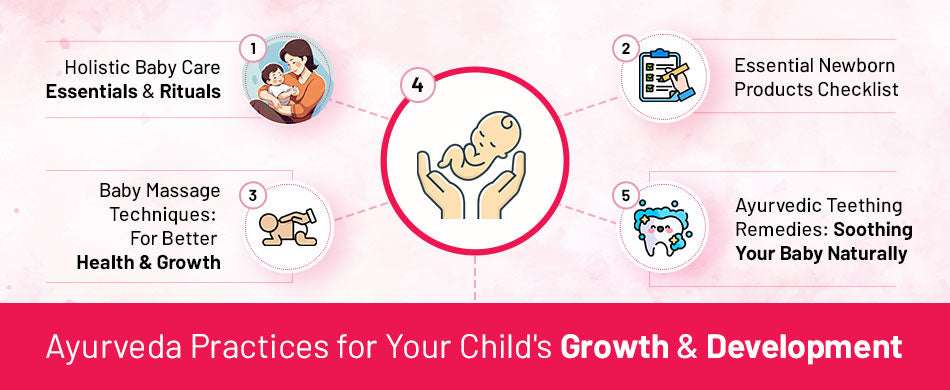Ayurveda Practices for Your Child's Growth and Development
- by Baby Organo

Babies deserve to be treated like angels because they are beautiful, innocent, and sensitive. Learning from Ayurveda helps people grow and develop in harmony with nature.
The ancient medical system views each child as a unique mix of doshas that determine their physical, mental, and emotional features. This dosha balance in Ayurveda keeps babies and toddlers healthy in every aspect. It recommends individualised food, lifestyle, and care.
From breastfeeding as a sacred bond to oil massage as a calming ritual, Ayurvedic practices emphasise caring touch, healthy foods, and thoughtful routines. Ayurveda can assist parents and other carers establish a secure and nurturing environment that assists kids in developing their full potential and promotes health as well as energy.
This article describes how Ayurvedic ideas can shape your child's development. It suggests strategies to enjoy and care for your child's childhood.
Understanding Ayurvedic Principles for Child Growth
Ayurveda, an ancient Indian science, says each child has a unique mix of three doshas. Vata, pitta, kapha. These doshas regulate body and mind functions. Prakriti is a child's unique constitution. In Ayurvedic Suvarnaprashan, children receive gold ash combined with honey and ghee to boost their immune systems and growth.
Knowing a child's Prakriti helps carers know what to feed, how to live, and how to care for them so they can grow and develop well without issues or diseases, according to Ayurveda.
Prakriti
At conception, vata, pitta, and kapha doshas determine a person's prakriti or innate composition. A child's Prakriti impacts their appearance, temperament, and illness. A youngster with high vata dosha may be creative, adaptable, and sensitive.
However, much data can induce gastrointestinal issues, anxiety, and anxiousness. Knowing each child's Prakriti helps carers support them.
Balanced Dosha
Ayurvedic health is dosha balance. A healthy, active child with balanced Vata, pitta, and kapha is less likely to get sick. Unbalanced doshas might cause health problems. Insomnia, anxiety, and digestion result from high VATA. Rashes, redness, and inflammation result from increased pitta.
Too much kapha causes weariness, weight gain, and congestion. Happy kids: balance doshas with diet, lifestyle, and medicine.
Breastfeeding
Child growth requires breastfeeding. Healthy babies get vitamins, minerals, lipids, and enzymes. Breastfeeding helps digestion. Nutrition from breast milk helps newborns grow. Pure sattvic breast milk gives kids all of these things.
Breastfeeding makes the bond between mum and baby stronger. For the first six months, Ayurvedic literature recommends breast milk. After that, the progressive introduction of complementary foods should continue while the baby is breastfed for two years or more, depending on needs.
Solid Food Introduction
Ayurvedic principles recommend carefully introducing solid foods to your child based on their readiness and digestion. Newborns start eating solids around six months when their stomach fire (Agni) can break down semi-solid and solid foods. Rice cereal, mashed fruits, sautéed veggies, and lentil soups are typical starters.
Then, add easier-to-digest meals incrementally. Carers should watch how the child reacts to new foods and adapt the diet to help digest and absorb nutrients.
Balanced Diet
Food might taste hot, sour, salty, bitter, astringent, or sweet, according to Ayurveda. Taste has an impact on metabolism, food, and health. This provides nutrients and health.
Healthy eating involves fresh, organic, and seasonal foods above processed and junk food. Carers should consider the child's constitution and digestion while arranging meals. Their foods and spices should assist the child's doshic balance and digestion.
Application of oil and massage
Abhyanga and oil massage stimulate kid development. When gently applied, HEATED OILS benefit skin, muscles, circulation, and nerves. For relaxation, energy stimulation, and stomach issues, massage the baby's head, feet, and stomach using the correct oils.
Carers should calm vata with sesame or coconut, chill pitta with coconut or sunflower, and warm Kapha with mustard or almond.
Nurturing Rituals and Massage Techniques
Massages and soothing rituals are essential for holistic baby and infant care, according to Ayurveda. These exercises benefit more than the child's health. They improve the child's mental and social health and strengthen the caregiver-child attachment. Let us examine some essential Ayurvedic massage and caring rituals:
Abhyanga (Oil Massage)
Abhyanga, an ancient Ayurvedic practice, comprises gentle body massage with heated oils. People utilise sesame, olive, or herb-infused Ayurvedic oils for this. The repetitive strokes and light pressure of the massage increase blood flow, skin nourishment, quietness of the nervous system, and muscular relaxation.
Many individuals do Abhyanga before bathing, but newborns and children can do it before bed to relax and sleep better.
Head and Scalp Massage
The gentle circular massage of a baby's head with warm oil is another Ayurvedic practice. This exercise relaxes, enhances blood flow, and feeds your scalp and hair cells.
Head and scalp massages help babies and youngsters build healthy hair and reduce stress. This massage treatment can help the child and caretaker sleep well by soothing them.
Foot Massage
Ayurvedic foot massage, which targets the soles and pressure points, relaxes and heals. Carers massage the feet with heated oil to boost circulation, reduce stress, and strengthen the feet and legs. Foot massages soothe newborns and toddlers.
They can relieve stress and tightness after a day of exploring and fun. This exercise helps children relax physically and feel safe and healthy.
Gentle Stomach Massage
Ayurveda recommends a soft, gentle, clockwise belly massage for babies and toddlers to improve digestion and relieve gas and colic. This compassionate act helps babies digest food, eliminate waste, and feel healthier.
Because they stimulate the digestive system and increase abdominal energy (prana), gentle stomach massages assist young children in staying healthy and energised.
Baby Bathing Ritual
Bathing, a sacred activity in Ayurveda, cleanses the body, stimulates the senses, relaxes, and bonds parents and children.
Natural, soft cleansers and warm water can help carers relax while washing. Gentle massages with water or herb-infused oils can also improve circulation, skin health, and relaxation. Bath time is a wonderful time to bond and care for one other, fostering kids' trust and wellness.
Ayurvedic Diet and Nutrition: Nurturing Infants and Toddlers
Ayurvedic principles explain how diet and nutrition are crucial for body equilibrium, especially for babies and children. These tips for cooking for young children can assist parents and other adults in enhancing their health and well-being, promoting complete growth and development.
Individualised Diet
The premise that every child has a unique Prakriti is central to Ayurveda. This particular makeup influences the child's digestion, nutrition, and health. The age, stage of development, doshic balance, and health of each kid are considered while developing Ayurvedic dietary recommendations.
Carers can ensure the child gets the optimum nutrition and development support by tailoring their food to their needs.
Incorporating Six Tastes
Tastes can be hot, sour, sweet, salty, bitter, or astringent in Ayurveda. Taste affects diet, metabolism, and overall health. To obtain all the nutrients they need and grow, infants and toddlers require a variety of tastes in their meals.
To do this, caretakers should offer youngsters foods that fit all six tastes. The child gets a balanced, nutritious supper.
Whole, fresh foods
Ayurveda says fresh, in-season foods are healthier, digestible, and body-friendly. Ayurvedic babies eat dairy, grains, legumes, nuts, seeds, and fresh produce.
Antioxidants, vitamins, minerals, and other newborn growth nutrients are in these meals - a healthy, fresh-food diet for your youngster. Kids eating healthy meals makes parents feel happy.
Mindful Food Combination
Ayurveda emphasises dietary combinations to improve nutrient absorption. Experts say that carers should mix dishes carefully, considering flavour, quality, and harmony. People believe some meals promote digestion and nutrient absorption while others cause digestive difficulties.
Picking foods that combine well and avoiding others can help babies and toddlers digest meals, reduce digestive difficulties, and get the most nutrients. Grain, legume, and healthy fat combinations boost digestion and health.
Drinking enough water
Due to their increased risk of dehydration, babies and children should consume enough water. Ayurvedic kids drink warm water or plant teas. Herbal teas from mild plants like coriander, fennel, and cumin can assist digestion, relax the stomach, and hydrate without harm.
Carers should encourage them to consume water or herbal teas to keep the youngster hydrated and promote their health. Nurture your child's growth with an Ayurvedic kid's health drink full of nutrients and herbs.
Daily life and routines
Your lifestyle and daily activities affect your baby or toddler's health, growth, and well-being. An Ayurvedic lifestyle can help carers provide a secure space for kids to grow in all areas.
Establishing Consistent Routines
Regularity and rituals help youngsters feel safe, protected, and predictable, encouraging physical, mental, and emotional growth. Wake, eat, rest, play, and bedtimes help the child's biological clock regulate sleep, digestion, and health. Because of safety and comfort, kids thrive on routines.
Age-Friendly Options
Play age-appropriate games for brain, fitness, and sensory stimulation. Crafts, tales, music, and sensory activities help toddlers develop creativity, imagination, and social skills. Carers should offer engaging and rewarding activities based on children's interests, talents, and stages to promote holistic development.
Calm Meal Environment
Babies and toddlers need a calm, peaceful environment to eat and digest well. Carers should minimise noise, displays, and technology during meals. It will be tranquil and conducive to mindful eating and socialising. Sharing and getting to know one another over family meals is fantastic. They also promote healthy eating and emotional relationships with food for long-term health.
Adequate Sleep
Infants and toddlers need sleep to develop and stay healthy. A pleasant bedroom and evening routine are vital for good sleep. Parents should create a nighttime routine with showers, gentle massages, tales, and quiet time to help youngsters relax and fall asleep. Dark, quiet, comfortable, and distraction-free bedrooms help babies and toddlers sleep deeper and more restfully, which is healthy for their growth.
Exploring Nature
Outdoor time improves kids' physical, social, and emotional health. Nature's noises, sights, and sensations inspire newborns and youngsters to be creative and explore. Outdoor activities like gardening, nature hikes, and sensory play help kids engage their senses, enhance their large and small movement skills, and connect with nature.
Explore nature to stay active, reduce stress, promote happiness, and improve brain function. Early environmental exploration helps kids build a lifelong regard for the environment.
Key Takeaways
Ayurveda promotes infant development through tailored care, balanced nutrition, loving habits, and a mindful lifestyle. Parents can improve their children's physical, mental, and social health using Ayurveda. Chocovita can help your child grow and develop delightfully and healthily, according to Ayurveda.
This will ensure them long, healthy lives. Ayurveda's ancient wisdom can help carers balance a child's life. This aids development from birth to toddlerhood and beyond. Based on individualized care, mindful practices, and natural cures, Ayurveda fully approaches children's health and wellness, helping them grow and thrive.
- Posted in:
- Parenting tips





